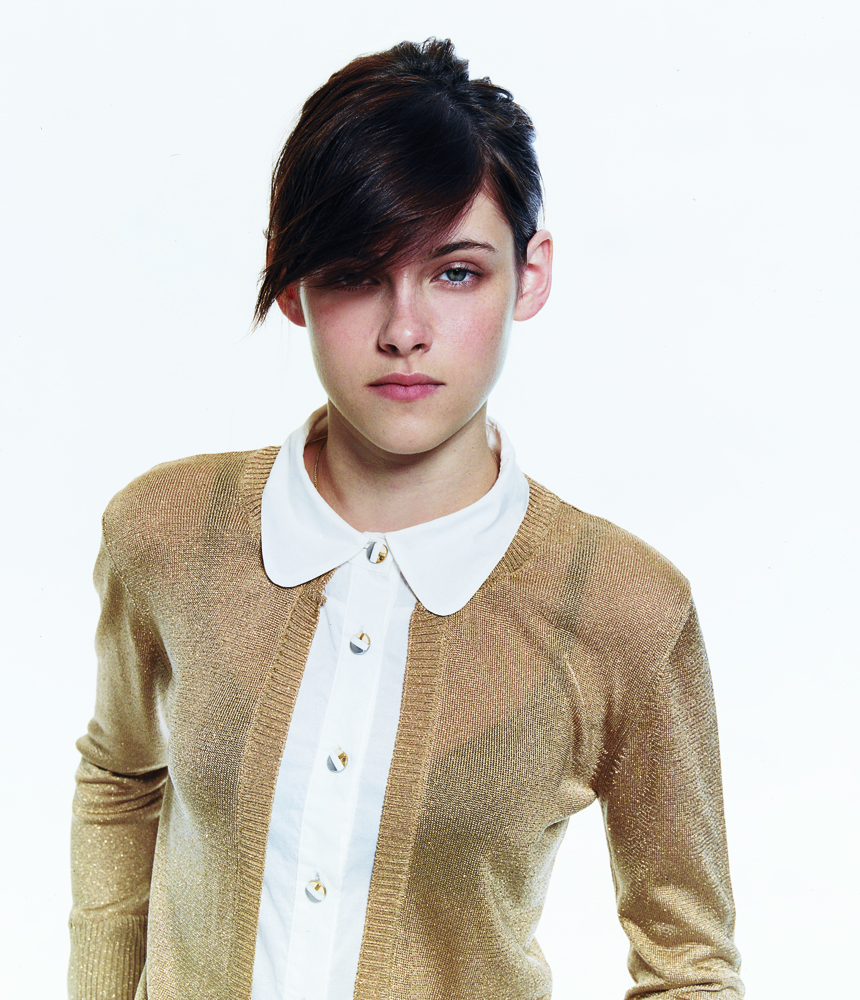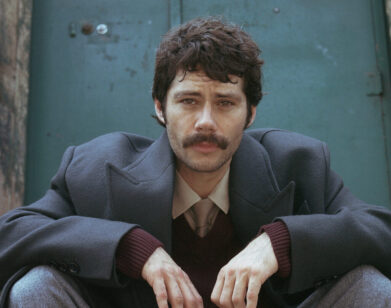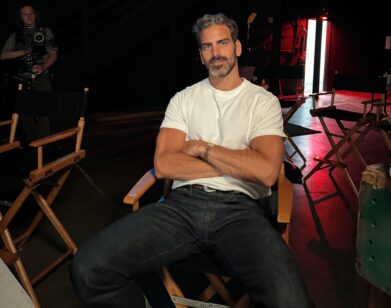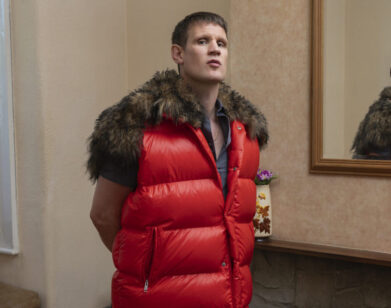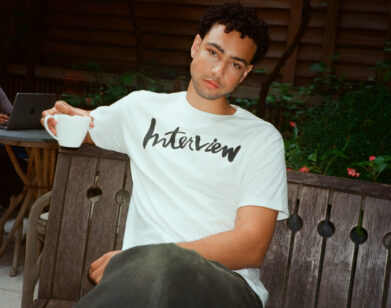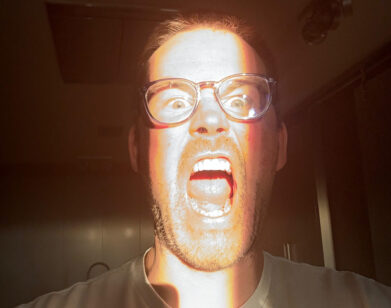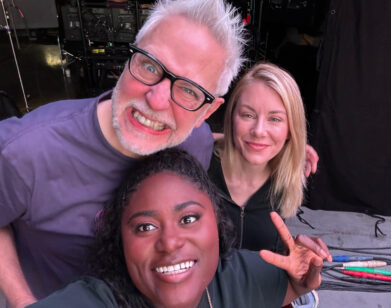Kristen Stewart
In an era when a vapid teen sex comedy seems to be the plat du jour for adolescent actors, 15-year-old Kristen Stewart is charting her own much more interesting path through the system. The toughness and maturity of her performance four years ago as the diabetic daughter of a recently divorced woman played by Jodie Foster in David Fincher’s claustrophobic thriller Panic Room (2002) was enough to put the world on notice. Her work since, with directors ranging from Mike Figgis (Cold Creek Manor, 2003) to David Gordon Green (Undertow, 2004) and Jon Favreau (Zathura), has done nothing but enhance that impression. This year she will appear in three very different films: Griffin Dunne’s Fierce People, a family drama in which she stars opposite Diane Lane, Donald Sutherland, and Anton Yelchin; Jonathan Kasdan’s In the Land of Women, a romantic comedy with The O.C.‘s Adam Brody and Meg Ryan; and The Messengers, from Hong Kong horror maestros Danny and Oxide Pang.
JON FAVREAU: Hello.
KRISTEN STEWART: Hi. Thanks for doing this, man. I’m totally stoked.
JF: Oh, I’m stoked to do it. Peter Berg interviewed me for one of these years ago [June 1998]. I wanted to be more prepared than he was.
KS: [laughs] Oh, so you know about my background now?
JF: I know everything about you. I would have never hired you had I known all this about you. [laughs] So, first of all, how are you doing?
KS: I’m good. I’ve been sick for the last two weeks. I’ve had a cold that I cannot get rid of. It’s kind of embarrassing. I was in a read-through yesterday and I just gurgled during the entire thing. It was so quiet in there. It was for Sean Penn.
JF: Was that the first time you met him?
KS: Yeah, it was. He called my agent a week ago and just asked if I’d come in and read cold, and then the first time I met him was yesterday. It was a table read. David Spade was there. Emile Hirsch was there. That was cool. He’s so good.
JF: So was your throat gurgling or your stomach gurgling?
KS: Luckily, it was my throat. But I was also sniffing every five seconds. And the thing is, I was reading the narrator part, so I was constantly doing these really long blocks of dialogue.
JF: Well, hopefully they knew you were sick and not a drug user. I auditioned for Sean once. It was for I am Sam [2001], for the part of one of the mentally challenged people. I figured, Okay, I’ll read this to read with Sean. And then it was him in his trailer on the set of the movie and me reading in front of him trying to play a mentally challenged person, which is not easy to do without making a complete ass of yourself. I actually got beat out for the part by someone who indeed did have Down syndrome, so that’s sort of a consolation. Anyhow, you’re working your ass off now, and all the movies you’re doing seem like good projects. What was your first big role? Was it Panic Room?
KS: Yeah.
JF: I visited that set because I know Dwight Yoakam, who was in the movie.
KS: Oh, yeah? He’s so funny. Did you get to go into the house?
JF: Yeah, I walked around the whole thing.
KS: Everything in the house in Panic Room worked. Every outlet, every sink, everything. There’s a scene where Jodie Foster takes a minute to go pee, and you could hear it when she got up and flushed the toilet.
JF: She’s really peeing in that scene?
KS: [laughs] No. I don’t know. Maybe.
JF: Were you around in the beginning when Nicole Kidman was involved with the movie?
KS: Yeah. She hurt her knee. Then Jodie came in.
JF: It’s funny because you look so much alike, you could be her daughter.
KS: Everyone always says, “Kristen got Panic Room because she looks like Jodie Foster.” But it was actually Nicole Kidman who was supposed to play my mother.
my whole family is involved in the entertainment industry in some way. My brother’s a grip. My mom’s a scriptwriter. My dad’s a director. So it’s like, at heart I’m a below-the-line girl.Kristen Stewart
JF: But the cool thing is, like Jodie Foster, you’re being very smart about the types of roles you’re taking on. You got into acting because your dad [TV director John Stewart] exposed you to the industry. And you take it seriously. You seem to have a lot of maturity in your decision-making. You seem like a pretty together young lady who’s taking a very stressful set of circumstances, starring in all these movies, and taking it in stride.
KS: Well, this is never something that I sought out. For most actors, it’s such a struggle to get work. Once they have it, they feel that there’s an enormous amount of pressure on them to make it work, and have everyone love them. In my case, it was never like that. It was just about working with the people that I want to work with, and telling the stories that I want to tell, you know? And, you’re right, it was also because my whole family is involved in the entertainment industry in some way. My brother’s a grip. My mom’s a scriptwriter. My dad’s a director. So it’s like, at heart I’m a below-the-line girl.
JF: You really bring your lunch pail to work, so to speak. You’ve got a really strong blue-collar ethic about acting that I like to think I have, too. We auditioned a lot of people your age for Zathura, and I have to tell you, you really stood out as having a presence, and a look, and chops, and poise. Most young girls or boys have sort of an unfocused, scattered energy. You have a very still energy to you. And the other thing that was very interesting about you is that a lot of girls your age dress up like Hilary Duff or Britney Spears. They have a sultry thing going on and wear a lot of makeup, and their skirts are short, which can be uncomfortable to see. Whereas, I think you’re very attractive, but you remind me more of people like Kristy McNichol or Tatum O’Neal, the girls who were stars when I was growing up.
KS: I know what you mean.
JF: I thought it was such a cool mix. And then I looked on the Internet, and there are a lot of boys who have crushes on you.
KS: Really?
JF: There’s a whole generation of kids coming up who are totally tracking your work and who’ve probably got your picture up in their lockers.
KS: [laughs] God.
JF: When I saw you with the bleached hair, was it for In the Land of Women, in which you play Meg Ryan’s daughter?
KS: Yeah.
JF: You looked totally different. And in Fierce People you have a romantic interest, right? Anton Yelchin?
KS: Yeah. It was my first romantic role. It was a good first one, too, because their relationship is really innocent, very fresh and sweet. None of it was ever weird or awkward.
JF: And now you’ve done The Messengers with the Pang brothers.
KS: Yeah.
JF: I thought it was so funny that there was so much resistance to hire you for Zathura, but as soon as the executives at Sony saw you on film they ended up having you as one of the stars in The Messengers. What was that like, working on a horror movie?
KS: The thing is, it wasn’t like the girl in peril screaming, running around with her tits hanging out, running for her boyfriend. It wasn’t like that. It’s a very classic, very straightforward ghost story.
JF: Asian horror is really setting a trend. The Pang brothers are from Hong Kong, so they just bring a whole different sensibility to a horror movie. In Hong Kong, they’re actually doing stuff that’s very artistic and pushing boundaries.
KS: They take into account absolutely every single detail. With every frame it’s like they’ve painted a picture. They choose colors based on their symbolic meanings and their culture. I didn’t have any idea.
JF: I did that too, on Zathura, by the way.
KS: Oh, did you? [laughs]
JF: Yeah. I got my feng shui ex-pert to walk through the set.
KS: Because the Pang brothers are twins, they would rotate days on set. One of them would be editing, and one of them would be shooting with us. They broke up the scenes be-forehand and chose which scenes each of them wanted to do. I was nervous because I always thought, What if something happened one day and I have the other director the next and I can’t go back and talk about it? I don’t know about you, but I kind of rely on the director. If I don’t have someone to talk to about something that I’m not sure about, I freak out. But it was like working with the same guy. [Favreau laughs] Off set, they’re completely different. But professionally, directorially, they’re the same person. It was trippy.
JF: Wow, that is crazy. I guess it’s like cloning yourself.
KS: Pretty much.
JF: I wish I could have done that on Zathura. Where did you shoot The Messengers?
KS: We were in Saskatchewan, Canada.
JF: And you had to live there for a few months?
KS: Yeah, we had a farm out in the middle of nowhere, and any direction you looked in, you really couldn’t see anything. It was very, very flat. You could see your dog run away for miles. We had a big sunflower farm, a real one. It was huge. Aesthetically, it was probably the coolest set I’ve been to.
JF: And you had your teacher up there, too, right?
KS: Yeah, he was there.
JF: There’s been a lot of continuity with him in your life.
KS: There has. Totally.
JF: So that’s nice; it’s got to be tough, though. Are you able to maintain friendships with people you went to school with?
KS: It’s funny. When I stopped going to school, I got the strongest dose of perspective. When you’re a kid, your friends, your school, your teachers, your family-that’s your whole world, your whole existence. And then when I stopped going, I lost all my friends but the few that were really close to me. And I still maintain those friendships. My friends who are still going to school are still totally caught up in it. When they graduate, they’re going to experience the exact same thing that I did. I just went through it when I was in the seventh grade as opposed to the twelfth.
JF: It’s hard to take all that little stuff seriously. As you get older, you realize it’s just a game. But it prepares you for life because there are other games that adults get locked up in. Making movies is just as much of a game. They say Hollywood is like high school with money. So in a sense you’re just in a bigger high school now.
KS: I never really thought about that.
JF: The people who do well in Hollywood tend to be the people who did well in high school. Be-cause it really is about who’s in, who’s out, who’s cool. Then you get the nerds like me who know how to write or make movies, and they have to sort of make room for us. But we’re not calling the shots socially, you know? It is kind of funny. I can’t wait to see all your stuff. I’m just such a huge fan, and I couldn’t have been more pleased with what you did for me in the film, and I look forward to doing it again with you.
KS: Me too, man.
JF: All right. Take care.
KS: Later.

